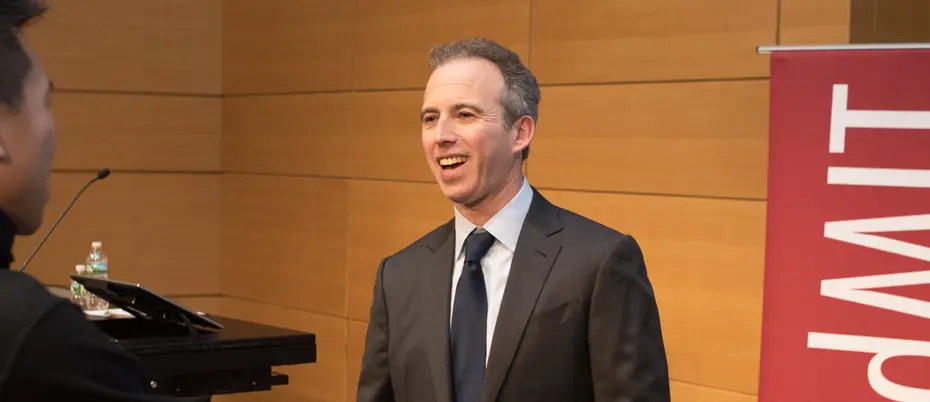Entrepreneurship
If you want to be a successful entrepreneur, talk less and be willing to do it all
If you want to start a company, listen up, then tell a story. If you want to grow a company, build a culture.
In 1984, Frederic Kerrest’s parents installed an Apple II Plus in his bedroom. Next month, his identity management software company Okta will start its ninth year of business — and second year as a public company — with $4 billion of enterprise value and a $4.4 billion market cap.
Okta’s cloud software provides a secure connection for its customers across software platforms and devices. Its customers include American Express, Nike, and DirecTV.
During an April 19 iLead speaker series event at MIT Sloan, Kerrest, Okta’s co-founder and chief operating officer, and a 2009 MIT Sloan MBA graduate, offered advice on being a successful salesperson, balancing personal interests with potential market energy, and leading by example.
Be the fox
The best salespeople shouldn’t be predatory alligators, Kerrest said. They should be more like foxes — specifically, Fennec foxes.
“Alligators have really big mouths and really small ears. Fennec foxes have giant ears and really small mouths,” Kerrest said. “The less the salesperson speaks in a meeting and the more the customers speaks, the better off you’re going to be.”
But when it is your turn to talk, make sure you have a story that everyone, including yourself, can buy into.
“You have to convince early employees to leave their awesome jobs at Google and Facebook,” Kerrest said. “You have to convince your vendors and partners to give you longer payment terms, you have to convince all these early customers to take early bets on you.”
Be at the center of the energy
No matter where you are in your career, Kerrest said, you should be thinking about the intersection of potential market energy and your personal interests.
“Think about markets that are early today, what you think could be very big down the road, and somehow overlap with what you’re interested in doing personally,” Kerrest said. “Think about what that will look like over the next 10, 20, 30 years, and how you can play in that space. For me those things were computers, enterprise software, and people.”
Kerrest joined Salesforce in 2002, and worked for the company for five years. He helped grow the company from 150 people to 3,500 employees, and from about $25 million in revenue to nearly $1 billion, he said. While attending MIT Sloan, Kerrest said he spoke to a former Salesforce colleague about how cloud-based companies like Salesforce and Successfactor needed “enabling infrastructure layers” that would help companies transition to the cloud.
That recognition of potential market energy, combined with Kerrest’s interest and experience, led him to co-found Okta.
Be willing to do it all
Today Okta has grown from Kerrest and cofounder Todd McKinnon, to about 1,300 employees in 15 countries around the world.
“It really becomes less about what you do every day and more about what everyone else does,” Kerrest said of the company’s growth. “It’s pretty easy when there’s two of you. It’s either the other person is doing [the work], you’re doing it, or it’s not getting done.”
To ensure a bar is set for the people who are hiring everyone else in the organization, Kerrest still interviews everyone at a director’s level or above.
Write down the culture that you want in your company, Kerrest said. Make sure you’re talking about what you care about, and demonstrate that through your actions.
“We try and talk about how we operate as a company,” Kerrest said. “It’s not about what you say — it’s how you act. Lead from the front. We went public Friday, April 7, 2017. On Monday, April 10, I was on a customer sales call. Why does that matter? It matters because you can’t ask anyone to do things you are not willing to do.”




